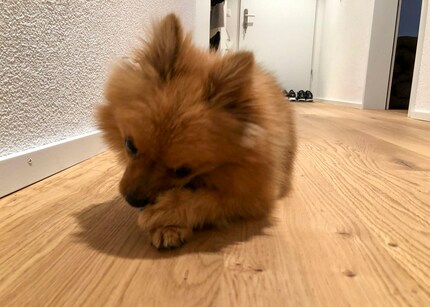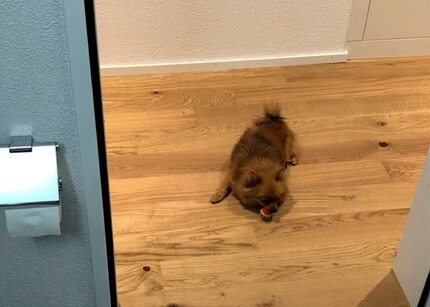
Background information
Dogs grow old too. What to do when a dog can no longer hear
by Mareike Steger

Your dog barks when you leave your home? This shows that he misses you. Read on to find out which tricks might help you change your furry friend’s behaviour.
Scratching on the door? Loud whining? As soon as you close the door behind you, your dog is alone. A pack animal by nature, your four-legged friend doesn’t like to be left alone. While some dogs use your absence to relax, others can’t cope with this situation. They’re stressed and don’t stop barking. However, there are also less obvious signs of separation anxiety.
The tendency to separation anxiety doesn’t depend on the breed. Just like humans, some dogs are more sociable than others. «Being in isolation for hours on end doesn’t come naturally to any dog,» says dog therapist Sonja Doll Hadorn. As a general rule, a dog shouldn’t be left alone for more than three to four hours. Character, experience, attitude and the relationship to the guardian are much more important than a dog’s breed. «A dog that lives with a single person 24 hours a day is more likely to have difficulty being alone than a dog that’s kept with other dogs or lives in a family of several people.»
Loud barking
«Barking is an expression of an increased level of emotion,» Sonja Doll Hadorn explains. However, as your dog isn't able to reduce stress by barking, he gets worked up and barks louder and louder. «You can hear by the sound of his barking if your dog is calling you or expressing his distress: barking and howling means ‘where are you?’ and angry yapping means ‘come home immediately’.» Most dogs don't call for you for quite some time. A control freak, however, will start barking the second you leave. «Separation anxiety gets worse very quickly. Especially if you only come home once your dog is totally worked up,» the expert explains. As a result, your four-legged friend feels stressed faster and faster and starts barking earlier.
Urinating and defecating
If your house-trained dog urinates on the floor, he isn’t punishing you for leaving. The mishap happens because of stress, usually immediately after you’ve left, and not because you left him alone for too long and he couldn’t hold it back any longer.
Self-injury
Experts speak of self-injury when a dog has a panic attack because of stress or fear. Your furry friend starts to lick itself or chew excessively – until he bleeds. «This usually happens because the dog can’t change the situation,» the dog therapist says. «If he tries to reduce stress with excessive body care, he can develop a kind of stereotype: the endorphins (colloquially: happiness hormones) released in the brain by the highly repetitive behaviour provide a feeling of relief.»
Destructive behaviour
As soon as you leave the house, your dog scratches or chews objects. «Chewing or digging is also behaviour that reduces stress,» Doll Hadorn explains. Doors, floors, walls, sofas or shoes – your dog will destroy anything. He scratches at the door or windows because he wants to follow his pack – you. If he's after items like your shoes, he's looking for something that smells like you.

No goodbye and welcome rituals
If you make a big deal out of leaving, it confirms to your dog that being alone is a bad thing. You support any anxiety he might already have and your dog might start to feel anxious even sooner – once you put on your jacket, for instance. Instead, do the following: ignore him about 30 minutes before you leave the house and don’t announce your departure. If he barks as soon as you close the door closes behind you, don’t go back to give him a treat and make him feel better. If you do, you're rewarding his behaviour and he'll do it again and again. Do the same when you return: ignore your dog at first and pet him once he’s calmed down.
Avoid punishment
If you come home and find your dog has urinated or defecated on the floor, don’t punish your furry friend. A punishment will only work if you catch him doing it – if it follows later, he won’t understand what you’re punishing him for and won’t learn anything. In the worst case, your dog will not only be stressed because he’s alone, but also because he’s afraid that you’ll punish him when you return.
Movement
Boredom can cause your dog to misbehave, especially when he's home alone. Keep him busy before you leave. Take him for a walk and let him sniff everything. This makes sure your dog is tired. However, don’t let him run around too much. This is fun for him, but it will also get him all worked up.

Your dog should learn to be alone as a puppy. If this wasn’t possible, as you got him later on in his life, you need to practise it once he’s grown up. There are various exercises to practise being alone. The dog expert recommends the following: «Teach your dog to stay in bed and be calm after a walk – no matter what you're doing.» Don’t talk to him during this timeout. Ignore him. «A sign that’s clearly visible for your dog and any family members can help. For example, always place the same cloth over the back of a chair.» It stands for the timeout.
Sonja Doll Hadorn add another tip: «Make sure that your dog doesn't follow you wherever you go, that he's not always looking for contact or constantly interacting with you.» If you do this, you promote separation anxiety. «Most dogs don’t show separation anxiety because they feel abandoned, but they experience loss of control over their guardian.»

If your dog has already developed a strong separation anxiety or has been showing signs of it for a long time, conventional measures won’t help. One method that has proven to be successful in these cases is systematic desensitisation. «A dog is trained in small therapy steps and with many repetitions to no longer react with fearful behaviour to certain stimuli», Sonja Doll Hadorn explains. «The goal of that your dog stays calm and in his place when you leave instead of getting all worked up and stressed.»
Desensitising a dog with long-lasting separation anxiety is a delicate matter and often only succeeds in close cooperation with a behavioural therapist. As soon as the behaviour of your four-legged friend causes problems for you and him, you should contact a specialist to find out what the cause and solution are.
When I’m not exploring the depths of the sea as an open water diver, I enjoy plunging into the world of fashion. On the streets of Paris, Milan and New York is where I keep my eyes peeled for the latest trends. And I’ll show you how to take them from the catwalk to your everyday life.
Interesting facts about products, behind-the-scenes looks at manufacturers and deep-dives on interesting people.
Show all